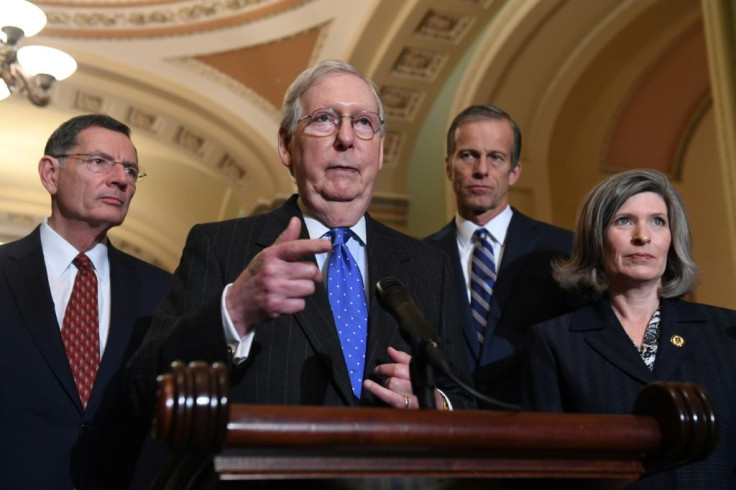Trump Impeachment: McConnell's Last-Minute Changes To Trial Rules Will Help Democrats

KEY POINTS
- Democrats and Republicans can now argue their impeachment case over three days instead of two
- Sen. Mitch McConnell made these changes after criticism from fellow GOP senators
- The arguments start Wednesday
Bowing to bipartisan pressure, House majority leader Sen. Mitch McConnell, R-Ky., at the start of the Senate impeachment trial Tuesday unexpectedly made several concessions to his resolution that ensure House Democrats' evidence will be admitted automatically into the trial record.
But amendments moved by Senate Minority Leader Chuck Schumer, D-N.Y., to subpoena the Trump administration for Ukraine documents were defeated by Republicans.
McConnell made last-minute handwritten changes to the draft impeachment trial rules he crafted and released Monday night. McConnell's original resolution gives the Democratic Party's House impeachment managers and Trump's defense team 24 hours to make arguments over two sessions on two days. McConnell now seems to favor extending the 24 hour period to three session days, which means each side can present its arguments over an eight hour-long period for three days, NBC News noted. McConnell also altered the rules for admitting the House evidence into the record -- it will now be admitted automatically, unless the President's team moves a motion against admitting it. McConnell made the changes after meeting with his colleagues.
Specifically, the revised McConnell resolution allows House impeachment managers and Trump's lawyers to present their opening arguments starting Wednesday at 1:00 p.m. It gives them 24 hours each over three days to make their case. Political analysts said the changes bring the Trump impeachment trial more in line with the rules of the Clinton impeachment.
At the end of these arguments, senators are given 16 hours to ask questions. There will also be two hours of arguments each by the House impeachment managers and Trump's lawyers.
McConnell's rules also contain an option for a motion to dismiss the case outright immediately after the resolution is adopted.
Democrats on Monday criticized McConnell for his draft resolution. They contend that the initial two-day parameters will place unnecessary time limits on arguments. McConnell's rules are also a radical departure from the rules governing former president Bill Clinton's Senate impeachment trial of 1999, which Senate Republicans initially said they would adhere to.
Democrats argued the original two day time span would leave them arguing their case into the middle of the night and into early morning, depriving the public of a chance to watch the proceedings. McConnell's resolution does have some similarities to the Clinton-era resolution.
"If Leader McConnell is so confident the president did nothing wrong, why don't they want the case to be presented in broad daylight?" Schumer asked Tuesday.
A number of GOP senators are also uneasy at the rules, which smacks of a blatant attempt to railroad the trial. Sen. Susan Collins (R-ME) said she and similarly minded Republican senators "raised concerns about the 24 hours of opening statements in two days and the admission of the House transcript in the record." She wants Trump's trial to follow the Clinton model as much as possible. She said McConnell's last-minute changes "are a significant improvement" over the initial rules.
The new schedule is a welcome news to Democrats, especially with all evidence gathered by the House Democrats' inquiry now being admitted by the Senate unless there is an objection.

© Copyright IBTimes 2024. All rights reserved.




















